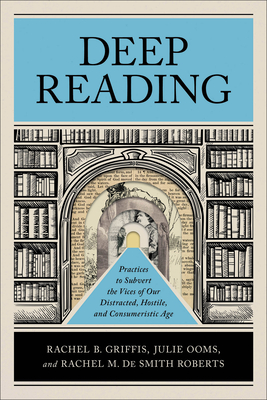
Griffis, Rachel B.
product information
description
tices that will result in deep, formative, and faithful reading so they can contribute to the flourishing of their communities and cultivate their own spiritual and intellectual depth.
The authors present reading as a remedy for three prevalent cultural vices--distraction, hostility, and consumerism--that impact the possibility of formative reading. Informed by James K. A. Smith's work on "the spiritual power of habit," Deep Reading provides resources for engaging in formative and culturally subversive reading practices that teach readers how to resist vices, love virtue, and desire the good.
Rather than emphasizing the spiritual benefits of reading specific texts such as Dante's Divine Comedy or Adventures of Huckleberry Finn, the authors focus on the practice of reading itself. They examine practices many teachers, students, and avid readers employ--such as reading lists, reading logs, and discussion--and demonstrate how such practices can be more effectively and intentionally harnessed to result in deep reading. The practices apply to any work that is meant to be read deeply.
The authors present reading as a remedy for three prevalent cultural vices--distraction, hostility, and consumerism--that impact the possibility of formative reading. Informed by James K. A. Smith's work on "the spiritual power of habit," Deep Reading provides resources for engaging in formative and culturally subversive reading practices that teach readers how to resist vices, love virtue, and desire the good.
Rather than emphasizing the spiritual benefits of reading specific texts such as Dante's Divine Comedy or Adventures of Huckleberry Finn, the authors focus on the practice of reading itself. They examine practices many teachers, students, and avid readers employ--such as reading lists, reading logs, and discussion--and demonstrate how such practices can be more effectively and intentionally harnessed to result in deep reading. The practices apply to any work that is meant to be read deeply.
member goods
No member items were found under this heading.
Return Policy
All sales are final
Shipping
No special shipping considerations available.
Shipping fees determined at checkout.







